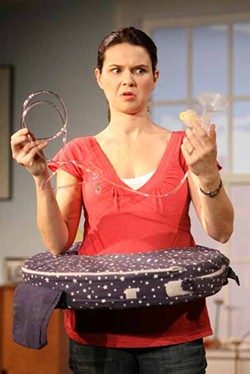Review of Amy Wilson's one-woman show, Mother Load
And an Argentinian pianist performs with CSO
By Perry TannenbaumCar seats, non-toxic toys, safe cribs, truly enriching bedtime stories, and top-notch daycare. If only quality parenting were just that complicated! No, as Amy Wilson reminds us in her engaging one-woman show, Mother Load, the intricate labyrinth leading to parental adequacy, laid out by a profusion of experts and hucksters, begins before an aspiring mom even conceives. Expectations for mother and child are twin Everests shadowing every step.
Wilson re-enacts the daily chaos of her own household, a whirlwind of three energetic pre-schoolers, and freezes in mid-scold. She confides her epiphany of realization with us in a voice that mixes frazzled exhaustion with shame, terror, and a twinkle of surprise: "I suck as a mom!"
For the next 70 minutes, Wilson recaps the journey that has led her to this horrible humiliation. The truth, we discover, is even worse than Wilson has described. Through fertility anxiety, fertility rituals and treatment, artificial insemination, organic pregnancy, a multitude of pre-natal orthodoxies, birth planning, a breastfeeding support group, the perils of thrush, boogying off her baby weight in aerobics class, and a hoity-toity pre-school tour, we can't help noticing that Wilson has been outrageously -- and hilariously -- suckered as a mom.
Connor, her first born, became an agonizing work-in-progress. Getting him into a choice pre-school became a nerve-wracking referendum on her entire parenting career, rejected 8-to-1 by the nine academies of lower learning she painstakingly filled out applications for. After being assured she was infertile, Wilson let her guard down and was cold-cocked by a second pregnancy.
Blumenthal PAC inaugurates its new Stage Door Theatre on the northeast corner of the BofA/PAC megaplex, looking out upon the scenic College Street construction site. A funky sandwich-board marquee clues you into the entrance, transformed from its warehouse door origins to a swanky glass-and-chrome double door. With the addition of curtains, the space has finally become the big black box studio venue planners promised us 16 years ago.
Comfort in the moveable seats is more consistently agreeable than sightlines. While the thrust configuration of the stage offers getaway opportunities for latecomers holding general admission tickets, Wilson and her director, Julie Kramer, make no adjustments for the folk in the side seats. Blocking and lighting, however, are as purposeful as Wilson's flawless performance. Footlights glare up at key moments, freezing the storyteller like road kill, each time she must take a fresh megadose of guilt. There's a rich payoff after Wilson spends 75 minutes doing her mommy duty, completely picking up the toys and assorted toddler-phernalia from the romper room set.
Lastly, to do this show week after week around the country, Wilson has to keep out-of-shape. Every time she lifts her top, revealing her puffy, crinkly "muffin top" spilling out over her waistband, Wilson shows us how seriously she takes her crusade.
After sweeping into town 17 months ago to replace departing Charlotte Symphony Orchestra music director Christof Perick on the podium for an all-Tchaikovsky program, Andrew Grams gave us a more considered and personalized demonstration of his claims to the throne. Back in April 2007, Grams was upstaged by Vadim Gluzman in the concerto and inconsistent in the Symphony #4 -- but electrifying at his best.
Grams' results last week, paired with piano phenom Ingrid Fliter in a program that showcased the Schumann Piano Concerto, vaulted the 30-year-old over nearly all the candidates I've seen so far. Curiously, two of the pieces Grams led had appeared together on the same program once before -- at CSO's 75th anniversary concert in November 2006, piloted by Perick and all his living predecessors. In both cases, the ensemble sounded better under the young upstart.
Under Grams, the CSO didn't get lost in the stop-and-go opening of Berlioz' "Roman Carnival Overture," there was no falloff in the excellence of Terry Maskin's English horn solo, and the brass -- three trombones and four trumpets -- were precisely drilled. Dynamic contrasts never fractured the music. Color from the two tambourines was as bright as the swirling flurry of cellos and winds was exhilarating.
We only heard the concluding allegro from Dvorak's Symphony #8 at the gala concert two years back. This time, we heard the equally impressive opening allegro, studded with more fine peroration from the trombones, dissolving into a solitary oboe passage from Hollis Ulaky and the paired flutes of Elizabeth Landon and Amy Whitehead. Ulaky played more ardently for Grams this time around, returning in the 3/4 grazioso movement after a luscious transparent launch from the first violins.
Trumpets, pared down to two from the Berlioz, sounded every bit as firm as the finale of 2006, blasting their fanfares with even more spirit. Cellos and violas had a warmth in their theme that evoked the choral movement of Beethoven's Ninth, and the wild neighing of the trombones sounded less panicky and rushed. No, Grams was not upstaged.
Winner of the quadrennial Gilmore Artist Award in 2006 -- and a tidy check for $300,000 -- Argentinean pianist Fliter did not make her entrance at the Belk with the air of an acknowledged diva. Nor was there any more than the perfunctory welcome from subscribers. The EMI recording artist had to win them over with her startling power and lyrical finesse.
From the opening bars, listening to either the soloist or the winds and strings behind her, you instantly recognized the Schumann as a great romantic concerto. The strings brooded, the full ensemble rocked the house, and principal clarinetist Eugene Kavadlo was Fliter's dreamy confidante before she flew away to Ingridland for her cadenza. She and the strings caressed the middle andantino breathtakingly, the winds behind her rising to choral sublimity as we segued to the crowdpleasing vivace.
No encore from Fliter, but -- surprise! -- Grams and the CSO tossed us a Brahms Hungarian Dance after the Dvorak. Rather helter-skelter to the ear, but a different message to the heart: This young man wants to lead this orchestra. Musicians certainly performed as if they love playing for him.
Latest in Performing Arts
More by Perry Tannenbaum
Calendar
-
An Evening With Phil Rosenthal Of "Somebody Feed Phil" @ Knight Theater
-
Kountry Wayne: The King Of Hearts Tour @ Ovens Auditorium
-

NEW WINDOW GALLERY-Pat Rhea-ACRYLIC PAINTINGS-April 05-30 2024 VALDESE, NC 28690 @ New Window Gallery/Play It Again Records
- Through April 30, 12 p.m.
-

Trap & Paint + Karaoke @ Zodiac Bar & Grill
-

LIVE MUSIC FRIDAYS!!! @ Elizabeth Parlour Room















